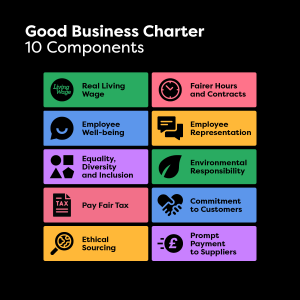Every great kitchen needs a great culinary oil and we’re delighted to provide our cold-pressed rapeseed oil to some of the most progressive and creative chefs in the UK.
From bistros and pubs to corporate kitchens and fine dining – Mellow Yellow is the counter oil of choice for many commercial kitchens looking for a quality oil that won’t leave a huge dent in that bottom line. And we’re delighted to have some of the best in the business flying the flag for our sustainable oil, including Michelin-starred chef, Adam Gray who was one of the first to switch to Mellow Yellow when we started producing in 2005.
Whilst our focus is national, there’s something rather wonderful about supporting local businesses and we are proud to supply some award-winning restaurants close to our farm in Hargrave, including James Peck’s Ember and the Tollemache Arms in Harrington – winner of the much sought after ‘Great British Pub of the Year‘ Award. But whether it’s local or further afield, our mission will always be to provide the best oil for the job. And with a growing demand from the food service sector, it’s clear that chefs are realising that one of the best quality oils of all might just be right here on this little island of ours!
Not only does cold-pressed rapeseed oil provide a huge saving to businesses in comparison to olive oil, it’s also incredibly tasty and much healthier than typical pomace oils and refined olive oils. Cold pressed rapeseed oil is brimming with omega-3 fatty acids and vitamin E, whilst the subtle nutty flavour and high smoke point make it a dream to work with – bringing not just flavour, but an elevated texture to foods.
But chefs don’t just want quality and flavour, they want ingredients that tell stories, with authenticity, character and sustainability at the core. As a carbon-neutral brand, we are proud to be the sustainable choice here in the UK and have been hugely encouraged by this industry shift championing British produce – and honouring it – in more ways than ever.
Find out more about the value of our cold-pressed rapeseed oil for food service, our sustainability work and our Mellow Yellow values.
Industry praise from Adam and James:
“I have used Mellow Yellow cold pressed rapeseed oil since 2005 in all of my commercial kitchens and also in my kitchen at home. As a chef who is passionate about nutrition and sustainability, it ticks all the boxes for me and is exceptionally versatile and cost effective.”
– Adam Gray
“I love using Mellow Yellow, not only is it local, sustainable and far more cost effective than olive oil, but it is perfect when used around woodfire for its high smoke point, I have been using it for years and will continue to do so.”
– James Peck
Our team headed to the Weetabix Northamptonshire Food & Drink Awards last week—an annual event that celebrates local food and drink suppliers, growers, and producers in Northampton. It was wonderful to be in a room with other like-minded folks, all striving for the same thing: to ensure the food we grow and create in the county is not just delicious and high in quality but also sustainable, ethical, and beneficial to everyone along the production line.
The Farming Environment Award is sponsored by Weetabix and recognises protocol growers who have supplied Weetabix within the last two years. It looks at growers who have taken meaningful steps to reduce the environmental impact of wheat growing, whilst taking measurable actions to reduce carbon footprint, promote biodiversity and practice regenerative agriculture.
We are so proud of our farm’s sustainable credentials and our ongoing work to promote biodiversity, so when Farrington’s Farm was announced as the winner of the GOLD award, we were naturally delighted! Of course, it’s always wonderful to win an award, but when it recognises the work, time, effort, and collaborative journey our team has been on to nurture our land and help it thrive, it is even more special.
Here are some of the reasons that led to our award win:-
– We are committed to regenerative agriculture and environmental preservation. And we are always looking at ways in which we can nurture our soil to ensure all of our crops, from wheat to make Britain’s favourite breakfast cereal, to rapeseed which we press on site to make Mellow Yellow cold pressed rapeseed oil is the absolute best it can be.
– We are a LEAF Marque accredited producer and a LEAF demonstration farm. This means we have been independently verified under LEAF’s robust sustainability credentials.
– We stopped ploughing in 1998 and practice minimum and zero tillage to establish crops. Allowing worms and other little soil beasties to create a healthy soil full of life to help us grow our crops.
– To date, around 6,000 trees and over 8km of hedges have been planted, along with extensive wildlife habits created, improved, and maintained around the farm.
– Our farm was certified Carbon Neutral in 2020.
– A network of over 8km of well-maintained public rights of way invites people to enjoy the countryside.
Find out more about our approach to sustainability and our credentials.
At Mellow Yellow, our commitment to creating a better world is at the heart of everything we do. This year, we’re excited to once again partner with Toilet Twinning, a remarkable charity dedicated to transforming lives by revolutionising sanitation.
Toilet Twinning directly addresses the global sanitation crisis by providing clean and safe toilets to those in need, perfectly aligning with our values and dedication to sustainable development.
Join us as we delve into the impactful work of this inspiring organisation, its transformative effects on communities, and how you can join forces with us to make a meaningful difference.
This year, we’ve proudly twinned with 3 toilets:


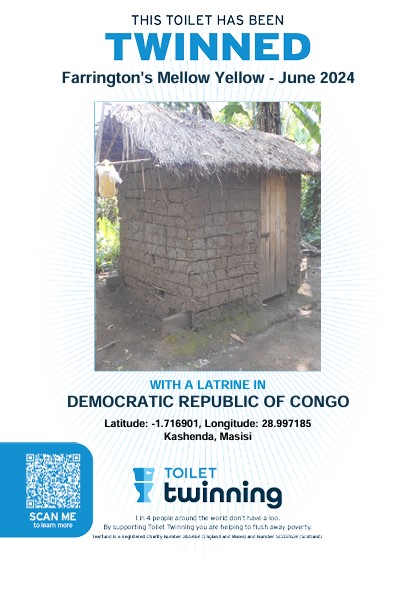
The Vital Mission of Toilet Twinning
Toilet Twinning addresses the global sanitation crisis by pairing your toilet with one in a developing country. For just £60, you can twin your toilet, funding projects that construct basic but vital latrines. This initiative provides essential sanitation and promotes health, safety, and dignity.
Why Sanitation is Crucial
Sanitation is a fundamental human right. But the statistics are shocking. 1.5 billion people in the world, almost one in five – don’t have a decent toilet of their own. This absence of proper facilities leads to severe health risks, educational setbacks, and economic instability. Diseases like cholera and diarrhoea spread rapidly in unsanitary conditions, posing significant threats to vulnerable populations, especially children. Every two minutes, a child under five dies due to illnesses caused by dirty water.
Furthermore, Toilet Twinning’s mission is directly aligned with the United Nations’ Sustainable Development Goals, specifically Goal 6, which aims to ensure access to clean water and sanitation for all. By supporting Toilet Twinning’s initiatives, individuals and organisations contribute to the global effort to achieve this essential goal, thereby making a tangible and lasting impact on vulnerable communities worldwide.
The Transformative Impact of Toilet Twinning
Toilet Twinning’s work creates profound, positive change in the communities it serves. Here’s how:
1. Health Improvement: Access to clean toilets significantly reduces the spread of disease, improving overall community health.
2. Empowering Women and Girls: Safe sanitation facilities provide women and girls with the dignity and security they deserve, shielding them from any dangers. These facilities empower them to attend school and work confidently, without fear, opening doors to education and economic opportunities.
3. Educational Benefits: Schools with proper sanitation facilities see higher attendance rates, particularly among girls, who no longer miss school due to a lack of toilets.
4. Economic Stability: Healthy communities can focus on education and productivity rather than battling preventable illnesses, fostering economic growth and stability.
How You Can Get Involved
Join us in the mission to improve global sanitation is simple and impactful. Here’s how you can help:
1. Twin Your Toilet: For £60, you can twin your toilet, supporting the construction of a latrine for a family in need.
2. Raise Awareness: Share the importance of sanitation and the work of Toilet Twinning with your friends, family, and network.
3. Fundraise: Organise events or challenges to raise funds for Toilet Twinning, engaging your community in this vital cause.
4. Donate: Contribute to Toilet Twinning to support their ongoing, life-changing work.
Final thoughts
At Farrington Oils, our commitment to making a difference extends to supporting Toilet Twinning’s transformative mission. We believe everyone deserves the dignity and safety of a proper toilet, and we are proud to contribute to this global effort. Together, we can improve sanitation, protect health, and change lives for the better.
For more information on twining your toilet or getting involved, visit Toilet Twinning’s website.
Let’s work together to flush away poverty, one toilet at a time! Visit www.toilettwinning.org
As with most foods that you’ll find on the shelf, there are huge discrepancies in flavour, taste and texture, the majority of which come down to two things – quality of produce and production techniques.
Cultivation, ingredients, provenance, handling, packaging, storage – all of these factors play a HUGE role in how food looks, tastes and performs when we cook – not to mention the health benefits that it can bring to the table. Perfecting these processes form the foundation of everything we do here at Farrington’s Mellow Yellow, but it’s in our core method: the act of cold pressing our seeds, where the real conduit to quality and value lies.
A better way of doing things
In the same way that a cold pressed juice retains more vitamins, enzymes, minerals and antioxidants than it’s processed counterparts, cold pressed rapeseed oil offers very similar benefits. We never expose the seeds to heat, and we never add anything artificial. Our method simply allows us to extract every ounce of flavour from our seeds whilst maintaining nutritionally beneficial plant sterols, vitamins and healthy fats.
At Farrington’s Mellow Yellow our process is simple: we take the best quality seeds; mechanically squeeze them to release the oil and then filter through a large tea style strainer, before putting the fresh, pure oil in a bottle ready for you to enjoy. As part of this process, we carry out around 39 quality checks on every bottle of oil or salad dressing we make, ensuring only the very best is good enough. Simple pure Mellow Yellow pleasure!
Most culinary oils consumed globally are refined as opposed to being cold pressed. For olive oil this process includes using hexane solvent, phosphoric acid, caustic soda, water and temperatures reaching 250°C. For rapeseed oil the process includes hexane solvent and temperatures around 90°C. These industrial processes lose much of the quality, flavour and colour characteristics of the original oils. Refined olive oil is also referred to as pomace oil.
As the magic ingredient behind the healthy Mediterranean diet, olive oil is often perceived as the gold standard in oils. And it’s true – olive oil is great! But so are other oils too. And when it comes to health benefits, rapeseed oil supersedes olive oil in many ways, particularly when the oils are cold pressed.
At Farrington’s Mellow Yellow, we’re proud to produce a rapeseed oil with seeds originating from LEAF Marque grower farms and our own family farm here in Hargrave. We value traceability enormously and we are proud to be at the helm of our production line – sowing, growing and pressing the rapeseed oil into high quality, delicious bottles for you to enjoy at home.
Inflation; The cost of living; Global shocks; Food shortages; Extreme weather. The last couple of years have played host to an onslaught of major events, resulting in big price increases to the things we buy – particularly food.
We know the food service industry has been hugely impacted by these events. So, in this post we’re focusing on our Mellow Yellow values: the importance of ingredients, provenance, quality and fair pricing in the face of what appears to be huge changes for the British food industry. As producers of fine quality rapeseed oil, we understand that as chefs, business owners and fellow producers, you don’t want to compromise on values – especially when it comes to ingredients: the bread and butter of your business.
And we’re singing the praises of rapeseed oil – the gold nectar of our business – that brings a wealth of creative opportunities and quality culinary moments to your kitchen, without the same price hikes we’re witnessing across the olive oil industry.
The changing landscape of culinary oils
The Ukrainian conflict combined with the extreme heat and wildfires in the Mediterranean have led to massive inflationary pressures on culinary oils over the last two years, with prices doubling in many cases. Whilst the initial shocks of the Ukrainian conflict have somewhat subsided, the continued difficulties in olive oil producing regions due to extreme weather conditions and disease killing olive trees, is leading to a longer-term shortage of olive oil globally, with big price increases as a result.
These price hikes have inevitably imposed huge pressures on business margins, which is why, here at Farrington’s Mellow Yellow we have worked hard to keep price rises to an absolute minimum. It’s fair to say it’s not always been easy! Our electricity bill tripled at one point and the jerry cans we use seemed to be creeping up in cost with every new order. As a fair wage employer – we’ve also been conscious to ensure that our loyal team have fair pay rises. Despite these challenges, we’ve managed to pick our way through the hurdles and avoid reactionary panic price increases.
Excellent value for money
We like to think that our cold pressed Farrington’s Mellow Yellow Rapeseed Oil, Chilli Oil and range of dressings continue to offer excellent value for money, helping you maintain your margins at a time when other ingredients are escalating in price, with zero compromises on the quality of your food.
Looking at the graph below, it is clear to see how Mellow Yellow rapeseed oil compares to extra virgin olive oil (EVO) and pomace oil over the last two years, showing that you can continue enjoying the wonderful taste, versatility, health and sustainable values of Mellow Yellow, without a negative impact to your bottom line.

EVO has nearly doubled in price, while the inferior refined pomace oil has increased to the same price as Mellow Yellow. With Mellow Yellow cold pressed rapeseed oil, you have the opportunity to use a premium, sustainably produced British oil with similar provenance to EVO, whilst it’s mild subtle nutty flavour and high smoke point make it truly versatile in the kitchen; it is the oil of choice for much of your culinary requirements.
There’s no need to resort to a refined commodity pomace oil when Mellow Yellow tastes better, performs better and is better for your bottom line. A premium quality ingredient that works hard for you in your kitchen. That’s the Mellow Yellow promise. That’s the Mellow Yellow value.
Food is an opportunity to nourish, refuel and energise the body. But it’s also an opportunity to experience flavour in all of its incredible shapes and forms. And for that – you need versatile products in your store cupboard!
In this post – the 4th in our Mellow Yellow Values Series – we’re focusing on the value of versatility across our full product range and the benefits that can bring to modern cooking, modern eating and modern life.
Help! Which oil?
There are multiple choices of oils and fats to use in our cooking repertoire. Some you may use occasionally for a specific recipe; others are more versatile as store cupboard essentials; then there’s that one lurking at the back of the cupboard collecting dust because you can’t remember what you bought it for! So much choice, so much confusion. So, which oils REALLY offer the best value and deserve pride of place in our kitchen?
Culinary oils are often segregated into two camps – one for cooking, one for drizzling. But what if there was an oil that was good enough to handle both? Saving you money, but also saving countertop space without any health compromises.
Farrington’s Mellow Yellow rapeseed oils and dressings offer the opportunity to become valued store cupboard essentials. Cold pressed for maintaining nutrients and known for its high smoke point, it’s the ideal meet-in-the-middle oil that’s a dream drizzled onto salads, or into a pan or roasting dish to cook a main meal.
The original Mellow Yellow Cold Pressed Rapeseed Oil is a truly versatile oil. It has a delicious subtle nutty flavour, with buttery undertones; it is clean on the tongue and unlike some oils, it doesn’t have an oily, or bitter aftertaste. This clean subtle flavour allows other ingredients to shine through, and it’s the unsung hero in a salad dressing due to its excellent emulsifying properties and subtle flavour.
Mellow Yellow for cooking and baking
Mellow Yellow is ideal for baking breads and cakes due to its clean light flavour, it doesn’t overpower or taint a cake like a more robust oil. Whilst most people are familiar with butter or non-dairy spread for baking, Mellow Yellow is an excellent and healthy option in many recipes. We have plenty of delicious recipes on our website to inspire you – our Courgette Loaf Cake and Beetroot & Chocolate Cake being particular favourites. For something a little different, you could try our Chilli Oil in making a Chilli Chocolate Brownie – the perfect melody of rich and spicy! Feel free to experiment with your own ideas too – we love to see how you use Mellow Yellow in your home kitchen.
Mellow Yellow Cold Pressed Rapeseed Oil has a high smoke point of around 230°C, making it ideal for roasting ovens, stir fry pans or air fryers. Impress your family and friends as you enjoy excellent crispy roast potatoes, crunchy croutons, bruschetta and crispy tender stir-fried vegetables. No soggy food dripping in oil – just brilliantly cooked food with flavour up front and centre, just how it should be.
Mellow Yellow for drizzling
Drizzled on a simple salad with a little seasoning and vinegar or worked into your own homemade dressing – our four classic Mellow Yellow Salad Dressings are packed with robust, clean and delightful flavours to elevate your plates.
Choose from Honey & Mustard; Balsamic Vinegar; Classic Vinaigrette and Chilli & Cumin, all ready-made for you, using the same quality ingredients you would use yourself at home. Our quality dressings are also a handy way to amplify the flavours in your homemade marinades and sauces. How about salmon fillet lightly cooked in Chilli & Cumin dressing for a refreshing aromatic dish? Or our classic Roasted Honey & Mustard New Potatoes ? There are plenty of ideas on our recipes page to inspire something different for dinner tonight.
A particular favourite of ours is our Seed & Nut Granola recipe, where the subtle nutty flavour of Mellow Yellow combines perfectly with chopped nuts, seeds and oats to make a delicious breakfast treat. Or, if you’re looking for something a little heartier, there’s always the full English! Whether you opt for vegetarian or meat – the sky is the limit with Mellow Yellow. Fried eggs, potatoes, mushrooms, hash browns, baked beans – we think you’ll agree, it’s a classic that never gets old.
Mellow Yellow for roasting and stir frying
It is high temperature cooking where Mellow Yellow excels compared to many other oils in the kitchen. Both the original Cold Pressed Rapeseed Oil and the Chilli Oil are fantastic for roasting and stir-frying. Whether you’re cooking the traditional family Sunday roast, or challenging yourself with more international flavours, Mellow Yellow has the taste, functionality and versatility you need to make cooking a treasured, memorable and fun part of home life. We like to think of it as the valued kitchen counter essential ingredient.
Browse our exciting recipe pages for inspiration and ideas of how to dress, drizzle, marinade, bake, roast or stir fry with Farrington’s Mellow Yellow. Happy cooking!
Everyone has a favourite culinary oil in their kitchen, you may use different oils depending on the occasion. Some people worry that some oils may be ‘bad’, and others are ‘good,’ often picked up from different marketing messages, urban myths, or the occasional extreme sensationalist social media campaign.
Like most oils on the shelf, rapeseed oil has had its share of unfair criticism during it’s time. So, in this post – the second in our values campaign – we wanted to address some of the myths and talk more about all of the good stuff rapeseed oil brings to your health and your kitchen.
Balance of healthy fats
Rapeseed oil has an excellent balance of different fats which support our general health and well-being, including heart health and maintaining healthy cholesterol levels, brain, skin and eye tissue development. It also has the lowest saturated fat of any culinary oil at 6%, compared to olive oil 14%, butter 51%, coconut oil 91%. Read more about fats here.

Omega 3 is an essential fatty acid that we get from our diets to regulate cholesterol, aid brain and eye health as well as other bodily metabolic functions. It is found in certain nuts and seeds, including rapeseed, with a content of 10% in cold pressed rapeseed oil, compared to nothing in many oils including palm, sunflower and coconut oils, and only 1% in olive oil.
Not only is cold pressed rapeseed oil the only high temperature culinary oil to contain Omega-3, it also has the perfect balance of Omega-6 which we need in small amounts in our diet. We require around two parts of Omega-6 for every one part of Omega-3 – the exact ratio found in cold pressed rapeseed oil. It’s an important balance to strike for good health, but we often see it go off course – especially in the case of highly processed western diets which can result in people consuming excessive amounts of Omega 6 – leading to negative health outcomes like poor heart health, inflammatory disease and depression.
Enriched with vitamins
An excellent source of vitamins E, K and provitamin A – cold pressed rapeseed oil is a great way to consume small amounts of these daily vitamins for general health.
Vitamin E is a powerful antioxidant that helps maintain healthy skin and eyes, whilst serving as a natural immune booster. Vitamin K regulates blood clotting, whilst provitamin A (also known as
a carotenoid) is an important antioxidant in the prevention of various types of cancers, as well as playing a crucial role in heart and eye health.
Sunflower oil is a very good source of Vitamin E at 73%, with rapeseed and olive oils at 30%, whilst coconut oil only has 1%. Cold pressed rapeseed oil and other brassica crops are good sources of vitamin K. Whilst rapeseed oil has around 5 times the antioxidant properties of Carotenoids (provitamin A) compared to olive oil.
Powered by Plant Sterols
Plant sterols are natural, fat-soluble compounds found in plants that are very efficient at reducing cholesterol levels. They are considered to be the most effective single food that can lower cholesterol as part of a healthy diet and lifestyle.
Rapeseed oil is an excellent source of these healthy compounds, with over double the sterol content of extra virgin cold pressed olive oil. Much of the plant sterol properties are lost in refined oils, but our cold pressing method ensures that Mellow Yellow maintains these cholesterol-reducing properties, making it a preferable choice for health in comparison to refined rapeseed oil. Interestingly, the plant sterols that are lost in the refined rapeseed oil process, are isolated and sold on to food manufacturers, to add back into products allowing them to claim the health benefit: “contains plant sterols.” An unnecessary complication some might argue!
Erucic acid
Erucic acid is a bitter-tasting, mono-unsaturated fatty acid produced in many green plants, constituting 30 to 60% of the total fatty acid content of mustard seed and traditional rapeseed varieties. There has been much speculation on the negative effects of erucic acid on human health, though no confirmed negative health effects have been formally documented in humans.
This combination of bitterness and potential health concerns have led to many varieties of rapeseed oil being naturally bred with lower levels of erucic acid (with a legal maximum level of under 2% for culinary rapeseed oil), resulting in a more subtle, nutty flavour. At Mellow Yellow, the content is in the region of less than 0.02% – a result of the rigorous testing we carry out on the best quality seeds before we press a single drop of oil.
The difference is Mellow Yellow
We believe a healthy, varied and balanced diet trumps the wide array of manufactured nutritional supplements you can buy off the shelf. It’s championing home cooking instead of processed food. And making authentic ingredients that are grown ethically and sustainably for health and not quick financial gain. That’s the Yellow Mellow ethos. That’s the Mellow Yellow value.
We hope you try our Rapeseed oil in your recipes, bring a little heat to the table with our subtle award-winning Chilli Oil and use our delicious salad dressings to add flavour and support the digestion of fat-soluble vitamins in your salads.
Why not browse our recipes and try something new? Not only will you be getting great quality and value for money, but a big win for health too
Global pandemics, inflation, conflicts, food shortages, climate change…. there’s no denying the fact that the world faces multiple challenges right now, many of which are having a big impact on the cost of living and consequently, the cost of food.
Here at Farrington’s Mellow Yellow, we’ve seen first-hand how this has impacted production lines – raising the price tag for everyone along the way, and eventually you – the end consumer. We’ve fought hard to keep the cost of our Mellow Yellow Rapeseed Oil and dressings as low as possible and we wanted to share a little bit about how (and why) we’ve chosen to do that.
Making good quality rapeseed oil accessible
Food brings people together and is a wonderful salve during testing times. A symbol of a life shared, cooking is a part of who we are, and we firmly believe that putting a great meal on the table, made with quality ingredients, shouldn’t cost a small fortune.
There are a few reasons why we’ve seen the prices of culinary oils explode in the last two years. The Ukrainian conflict, combined with the extreme heat and wildfires in the Mediterranean have led to huge inflationary pressures, with prices doubling in many cases. Whilst the initial shocks of the conflict have somewhat subsided, the continued difficulties in olive oil producing regions due to extreme weather conditions and disease destroying olive trees, is leading to a longer-term shortage of olive oil globally, with escalating price increases as a result.
While many oils have increased in price, at Farrington’s Mellow Yellow we have manged to keep price rises to an absolute minimum. This of course, hasn’t come without challenges! The cost of our electricity tripled at one point and the price of our glass bottles increased dramatically due to the high energy used to manufacture glass. It’s been tricky at times, but we have managed to pick our way through the hurdles to avoid the difficult scenario of hefty price increases and wage decreases, ensuring that our loyal team continue to have fair and reasonable pay. And you – our loyal customers – can continue to enjoy Farrington’s Mellow Yellow in all of your favourite dishes.
The graph below illustrates how Mellow Yellow Cold Pressed Rapeseed Oil compares to a leading brand of olive oil over the last two years, showing that you can continue enjoying the wonderful taste, versatility, health and sustainable values of Mellow Yellow, without costing the earth.
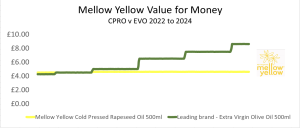
This next graph shows a similar story with our delicious chilli oil which is gaining a loyal following of customers who enjoy something a little warmer in their recipes or simply drizzled over pizza, salad and favourite meals.
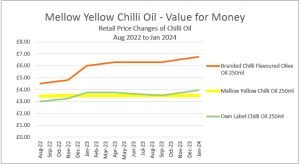
This final graph shows how Farrington’s Mellow Yellow dressings remain excellent value for money in comparison to other leading brands. We have compared prices against similar products, but it is only a Mellow Yellow dressing that is made from unrefined cold pressed rapeseed oil, with great quality ingredients and absolutely ZERO additives, preservatives, or artificial stabilisers.
There are of course cheaper alternative dressings, but many of these come with a long list of processed ingredients. Mellow Yellow dressings are made just as you would do at home, but with our thoughtful ingredient profile and delicious flavours, you can leave the hard work to us and simply enjoy drizzling Farrington’s Mellow Yellow on your favourite salads!
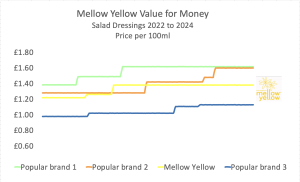
Whatever your choice in oils and salad dressings, if you haven’t already tried the delicious flavours of Farrington’s Mellow Yellow, now is the perfect opportunity to search them out knowing that not everything good costs the earth. And if you’re an existing customer who is enjoying Mellow Yellow products in your home cooking, we would like to give you our heartfelt thanks for supporting our family business. We hope that our great values continue to inspire you!
Here at Farrington’s Mellow Yellow, we are very proud of the delicious range of rapeseed oils and salad dressings produced on our farm. Ever since launching Mellow Yellow in 2005 as the first cold pressed rapeseed oil in Britain to be sown, grown, pressed and bottled on the farm, I have been driven by the ambition to produce the very best we can; to create sustainable food with quality and integrity at its heart. From our small beginnings producing a few bottles a year, to today, with the support of our dedicated team in our factory at Bottom Farm, those values remain as important today as they were on day one.
Over the coming months, we’ll be sharing with you some of the core values behind Mellow Yellow. Because in the current climate, we believe that value is imperative to get right – for you, our valued consumer, but also for everyone involved in the journey from seed to bottle.
It could be the health values of Mellow Yellow, which as a cold pressed rapeseed oil has the lowest saturated fat of any culinary oil; is high in Omega-3; and packed with cholesterol busting plant sterols (over twice as much found in extra virgin olive oil, for example). Then there is value for money. At a time when the price of food is rising alongside the escalating cost of living, Farrington’s Mellow Yellow products offer exceptional value in comparison to many alternatives, some of which have more than doubled in cost.
We’ll look at the environmental and social values of Mellow Yellow, which as an oil grown from British rapeseed to LEAF Marque standards sets the bar for others to follow. The appreciation for our team – the heart and soul of our business – all of whom are signed up to the Living Wage Foundation, ensuring jobs that are valued with fair pay for all. Indeed, we are delighted to be accredited by the Good Business Charter and VERY proud to be a recipient of the Queen’s Award for Enterprise for Sustainable Development.
Lastly, let’s not forget the values of Farrington’s Mellow Yellow in your kitchen; as an excellent roasting oil with its high smoke point, or its subtle nutty flavour – a truly versatile ingredient for so many recipes. And our delicious salad dressings – each made with quality, additive-free ingredients, so you can confidently drizzle onto salads and into marinades, knowing there’s nothing unrecognisable in our quality blends.
People often ask us what they can use their bottle of Mellow Yellow for, so we created a huge bank of recipes to inspire you to get creative in the kitchen. From breakfast and baking to dairy-free, family meals, dips (and everything else in between) there’s plenty of inspiring ways to enjoy Mellow Yellow and try something new.
Value for people and planet is at the heart of everything we do here at Farrington’s Mellow Yellow, and I hope you’ll join us as we share more about the importance of values to us as a business.
Duncan Farrington.
We’re GBC accredited!
“I have always been adamant that we strive to do the right thing and do it to the best of our ability.” says Duncan Farrington. Whether this is in our private life, or in our business endeavours. The environment has been at the heart of Farrington’s Mellow Yellow from the start, which we are well recognised for, but beyond this we ensure that we work in a respectful way. Whether this being looking after our most important asset in our staff team; working with our dedicated suppliers in sourcing the best materials, services and ingredients and, ensuring we pay those suppliers promptly; working with our trusted customers who sell the values of our Farrington’s Mellow Yellow products; or indeed ensuring we pay our taxes correctly.
To my mind honesty and integrity are the simple and only way to run a successful business for the long term – I like to do business with people I like to do business with. We have tried to ensure we work in an honest and trustworthy way from the start, ensuring that every bottle of Mellow Yellow offers great value, produced with great values. Therefore, we were delighted to learn about the Good Business Charter which recognises that businesses like Farrington’s should be recognised for their good work.
We’re delighted to announce that Farrington Oils has recently achieved accreditation with the Good Business Charter! This accreditation, open to UK businesses and organisations of all sizes, recognises responsible business behaviour across ten key components. We feel that it is important to be accountable in the way we do business, and by gaining accreditation we are demonstrating our commitment to our staff, suppliers, customers and the environment. If you would like to find out more, please visit the GBC website.
Chairman of the GBC Board, Simon Fox, said: “The Good Business Charter brings together 10 standards, most of which already exist, but in separate places. We have brought them together to give a coherent overall position for businesses to aspire to. We believe that the GBC has enormous potential to change business practice for good.”
What is the GBC?
The Charter is an initiative developed and overseen by the Good Business Foundation, an independent charity established by entrepreneur Julian Richer. Working with organisations including the Trade Unions Congress, Institute of Directors and Federation of Small Businesses, they have set a benchmark for responsible business practice, which is accessible to all.
The Good Business Charter is a clear indicator that differentiates those organisations that can commit to our 10 components from those who cannot. The Good Business Charter exists for all companies and charities across all industries and sectors and works through a simple online self-certification process. The GBC and its members seek to inspire many other businesses to follow suit.

The GoodBusiness Charter brings together ten standards, most of which already exist, but in separate places. They are:
Real Living Wage
Fairer Hours and Contracts
Employee Well-Being
Employee Representation
Equality, Diversity & Inclusion
Environmental Responsibility
Pay Fair Tax
Commitment To Customers
Ethical Sourcing
Prompt Payment to Suppliers
What will GBC Accreditation bring to Farrington Oils?
-We commit to pay our directly employed and regularly contracted staff the real living wage as defined by the Living Wage Foundation.
-We commit to communicating and using fair, transparent contracts for our employees that are mutually beneficial and accepted by both us and the employee. Farrington Oils does not have any zero hours contracts.
-We will actively support and encourage employee well-being treating those with legitimate sickness in a fair and respectful manner and promote access to impartial support and advice for employees with physical and mental health needs.
-We commit to having a way where every employee can make suggestions or raise issues with senior management.
-We commit to have robust measures in place to encourage diversity at key stages of recruitment, selection and retention of employees and to prevent harassment or victimisation in the workplace.
-We care about the environment and encourage the development of good environmental practice as an organisation, seeking to minimise our impact and commit to improve it.
-We commit to pay our taxes where applicable, only use tax allowances for the purpose intended, and be transparent in our relationship with HMRC.
-We have a clear commitment to our stakeholders and prioritise addressing and learning from stakeholder feedback, seeking to put negative issues right.
-We commit to ethical sourcing of anything we purchase, such as by applying standards set out in the Ethical Trading Initiative Base Code where relevant.
-We commit to paying our suppliers promptly, and within at least 30 days.

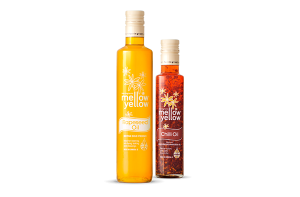 Oils
Oils Rapeseed Oil
Rapeseed Oil Chili Oil
Chili Oil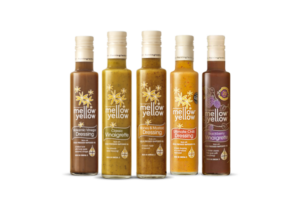 Dressings
Dressings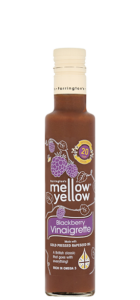 Blackberry Vinaigrette
Blackberry Vinaigrette Classic Vinaigrette
Classic Vinaigrette Balsamic Dressing
Balsamic Dressing Honey & Mustard
Honey & Mustard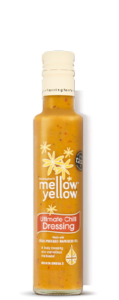 Ultimate Chilli Dressing
Ultimate Chilli Dressing